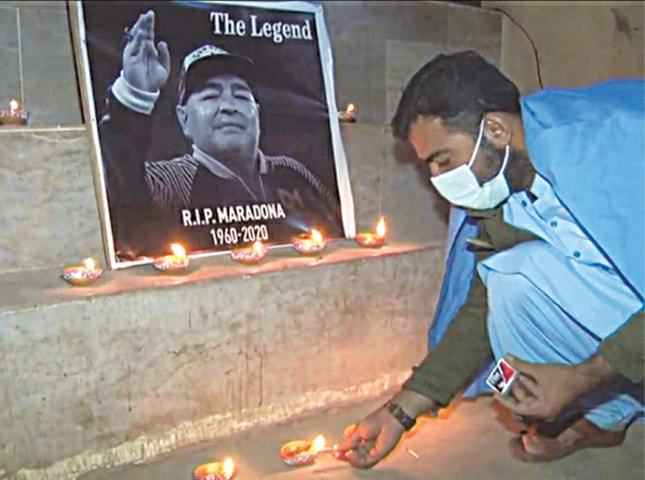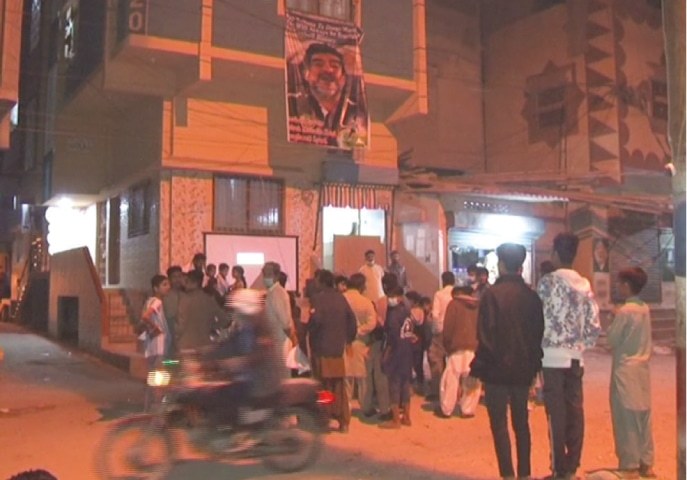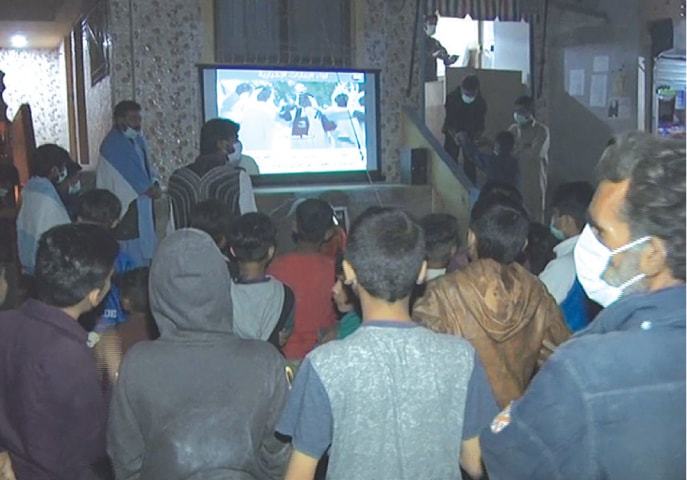by Shazia Hasan
How do you account for vigils for an Argentine footballer in the impoverished neighbourhoods of Karachi, more than 15,000 kilometres away? Especially among fans that swear allegiance to Argentina’s perennial footballing rival, Brazil? Is it simply paying respect to the sporting genius of a player? Or could it be something more?
“I have had the honour of watching Maradona in action, live, on the ground,” beams former Pakistan football team captain and the President’s Pride of Performance recipient Ali Nawaz Baloch.

The footballing great from Karachi’s old city neighbourhood of Lyari says that he watched Maradona’s game up close during the opening match of the 1990 FIFA Football World Cup in Italy, where the reigning champions Argentina were playing against Cameroon, and lost by 0-1.
Ali Nawaz, who played as a striker, and who is remembered for scoring several hat-tricks during matches including a triple hat-trick against a Middle-Eastern outfit while playing for the Dacca Mohammadans, says that he was a huge fan of Maradona. “He was the best player of his time, a great individual performer. The ball was only his alone when his stout little legs found it. Then it was no longer a team sport. It was Maradona’s game,” he points out.
“Then in the next World Cup hosted by USA, he failed the dope test and was taken out. If you ask me, that suspension was, in a way, the beginning of the end for him,” he says.

When asked if, as a big fan of the late footballer, he felt let down somewhat after he was found guilty of using contraband substances, Ali Nawaz shakes his head thoughtfully. “We were fans of his game, we tuned out the rest. To this day, I remember how he would dribble away the ball past four or five players. But yes, in 1994, even I noticed a change. But then he also got punished for it.”
And what about before that? What about the infamous ‘Hand of God’ goal during the 1986 World Cup — which Maradona was pilloried mercilessly for by the English? “Now look, you can’t blame Maradona for that,” Ali Nawaz is adamant. “It was not his fault. Players cheat, but then there are checks in place for that. No one, not the players, not the referees, saw it at the time. The match referees and officials were responsible for what happened, not the player, who came up with quite an explanation when his fist was noticed later on.”
Perhaps, like the Argentines, Pakistanis also like a bit of comeuppance for former colonial powers.

“No one’s perfect and Maradona wasn’t either,” Ali Nawaz continues. “In fact, it was this imperfection of his that sat quite well with football fans in Lyari. He wasn’t a white man, he didn’t start out rich, he earned what he had through his game, and he was undone by drugs. Many of Lyari’s youth identified with all that.”
The current captain of Pakistan’s national football team Saddam Hussain, who originally hails from Malir but has also played for Lyari clubs before he was selected for the Pakistan team and signed with FC Dordoi Bishkek, says that, to this day, professional footballers here and abroad watch old videos of Maradona’s game. “He possessed the most impressive skills on field. And we learn by watching him,” he says.
“During warm-ups before matches we do a few moves, Maradona style, just like we copy Messi and Ronaldo. Since we loved his game so much, we followed other stories about him as well. We used to read and watch all his interviews too, and shared interesting bits with friends,” Saddam expands.
“We in Pakistan often play football on muddy grounds and Maradona once said that, even if he were wearing a white dress at a wedding, he wouldn’t be able to resist stopping a ball with his chest. He would win our hearts with such kinds of quips,” Saddam laughs.
“Quite frankly, we in Lyari and Malir are also like that. We will tell our generations about Maradona and his kind of aggressive football and humble nature. See, he knew what he was and our love for him is unconditional,” he adds.
Talking over the phone from his hometown, Chaman, another of Pakistan’s football greats, former national captain Mohammad Essa, says that he was saddened to hear of Maradona’s death. “We will remember his game for years to come. Thankfully we have his match videos to keep watching him again and again, and to keep his legacy alive,’’ he says.
Nasir Karim Baloch, former District Football Association-South chairman and an ex-member of the Pakistan Football Federation’s (PFF) executive body, says that the passing of Maradona is being seen as a sad loss by football clubs in both Lyari and Malir.
“Both these areas, known as the breeding grounds for Pakistani footballers, are known to follow Brazil fanatically, but many here are also eager fans of Argentinean football. Pele of Brazil and Maradona of Argentina were their original heroes. In fact, it was Maradona, who turned their attention to Argentina,” he points out.
“Players like these are not born every day. And Maradona’s way of winning matches for his team singlehandedly made and will always make him stand out from the rest. He was a one-man show, on the field and off it,” says Nasir Karim.
“He may have done all kinds of things but that was Maradona for you. He followed the Argentinean Marxist revolutionary Che Guevara, and it was only through him that we in Lyari and Malir also got to know of him, because we followed Maradona. Whatever Maradona did, his game kept him in a good light among football fans.
“Of course, our younger generation of footballers follow Ronaldo and Messi more but now, after Maradona’s passing away, there have been so many vigils organised in his memory here, by the older fans, ahead of club matches along with observing of minute-long silences. In a way, it is educating our younger lot about this great player.
“The old match recordings, especially of the 1986 World Cup ones, being played on big screens put up at roundabouts in football neighborhoods is introducing them to Maradona, and they want to know more about him.”
The writer is a member of staff at Dawn
She tweets @HasanShazia


![Maradona of Pakistan [Dawn] Maradona of Pakistan [Dawn]](https://footballpakistan.com/wp-content/uploads/2020/11/Diego-Maradona-with-1986-FIFA-World-Cup-1160x727.jpg)